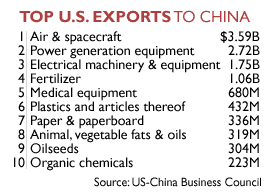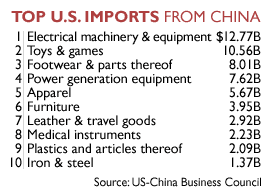|
Unions oppose trade pact
|
 |
May 22, 2000: 4:48 p.m. ET
Dumping, cheap labor fears spark protests over expanding ties with China
By Staff Writer John Chartier
|
NEW YORK (CNNfn) - Freighters ease into American ports, laden with cheap clothing, toys, and steel products from China. As those goods hit the market, they undercut prices of American goods and, with them, hundreds of thousands of American jobs.
At least that's the scenario feared by the nation's labor unions if Congress votes this week to grant China permanent normal trade relations (PNTR). Instead, organized labor wants the United States to continue an annual review of China's trading and human rights practices as it has done for the past 20 years.
"We're opposed to permanent normal trade relations at this time," John Sweeney, president of the AFL-CIO told CNNfn last week. "We support trade. We support the fact that globalization is here to stay, but we want to make sure it's working for working families."
Under the U.S.-China pact, Beijing would phase out restrictions on U.S. businesses seeking to operate in China, cut tariffs and eliminate import quotas, allowing American manufacturers to tap into China's market of 1.2 billion and increase investment in the communist country.
 But labor unions argue that hundreds of thousands of American jobs will disappear as more manufacturing moves overseas to take advantage of cheap labor. They say U.S. markets will be smothered with low-quality Chinese imports that consumers can buy for significantly less money than American goods. But labor unions argue that hundreds of thousands of American jobs will disappear as more manufacturing moves overseas to take advantage of cheap labor. They say U.S. markets will be smothered with low-quality Chinese imports that consumers can buy for significantly less money than American goods.
Ana Marshall, a sewing machine operator for a textile manufacturer in New York, said expanded trade ties with China could cost her a job.
Marshall, 49, who emigrated from Panama in 1981, cuts back on food and skips vacations to stretch her $300 weekly salary to cover the nearly $700-a-month rent for her Brooklyn apartment.
 "Now it's so hard to find a job," she said. "If my job is eliminated, I don't want to think about that. Sometimes when I see the homeless on the street, I wonder if I will be like them anytime soon." "Now it's so hard to find a job," she said. "If my job is eliminated, I don't want to think about that. Sometimes when I see the homeless on the street, I wonder if I will be like them anytime soon."
The American Textiles Manufacturers Institute, which represents the nation's textile manufacturers, contends that the U.S.-China trade pact would cost more than 150,000 U.S. textile jobs and that illegal smuggling of Chinese goods in to the U.S. will increase. China already unloads about $4 billion worth of apparel and textiles on the U.S. each year by illegally shipping goods under the labels of other countries, according to an institute spokeswoman.
"We're doing everything we can in terms of talking with people on the Hill, writing letters, getting the word out to our president," the spokeswoman said. "...The whole point is calling on China to play by the rules of the trade if they want to become a member of the WTO."
More stable business relationships
 China says PNTR will be accompanied by a reduction or removal of tariffs, quotas and barriers in the coming years. China says PNTR will be accompanied by a reduction or removal of tariffs, quotas and barriers in the coming years.
"(PNTR) will keep our credit relationships stable. Everyone won't have to worry if the tariff rate will be different," Zhang Yuanyuan, a Chinese Embassy spokesman said.
"The WTO agreement signed by our two countries is much broader than trade of textiles and footwear and other things," he said. "It is extended into service industries, insurance, telecommunications. People are even talking about providing medical services in China. It's a much broader thing."
Step by step
The United States and China have been moving toward normal trade relations over the last decade, as negotiations have continued over human rights issues and bilateral trade between the countries has gradually increased.
China's overall exports to the United States have grown to about $60 billion a year, according to the U.S.-China Business Council.
Exports of electrical machinery from China rose nearly 21 percent between 1997 and 1998; toys and games increased 12.7 percent and footwear, up 8 percent.
Despite allegations by critics in the United States, Yuanyuan said China does not tolerate "dumping" of goods, noting that it recently imposed penalties against Canada and South Korea for dumping newsprint into China.
"We believe it's an unfair means to achieve a competitive edge," Yuanyuan said.
Supporters of the deal point to safeguards written into the pact designed to prevent China from flooding U.S. markets with inferior, cheaply made goods.
Among the safeguards is a provision to treat China as a non-market economy in future anti-dumping cases for 15 years after its entry into the World Trade Organization.
The agreement would also allow the U.S. to restrict imports of specific products that come from China alone. A separate provision to restrict textile imports is extended from a 1997 agreement by four years, to 2008.
'Sucking sounds' in the East
American labor unions, still fuming over the passage of the North American Free Trade Agreement in 1993 that reduced trade barriers and tariffs between the United States, Canada and Mexico, are determined to fight the China pact.
"I think for us, we learned a hard lesson with NAFTA, and every trade agreement that has come down the pike since then," Chris Chafe, national political director for the Union of Needle Trades, Industrial and Textile Employees.
"When big business says there's going to be a market open in China, we remember the same message about Mexico. There was going to be a middle class created in Mexico. We know that in China right now there is no middle class that is going to be able to purchase our goods," Chafe said.
More than half a million American manufacturing jobs have been lost since NAFTA was enacted in 1994 as more and more production has moved offshore, according to statistics from the steel workers union. That number is expected to reach 700,000 by the end of 2000, the union says.
"This whole thing sounds real familiar, like what they said about NAFTA," said Tim Waters, a steel union spokesman.
"They said all this (NAFTA) is really going to create jobs in the United States. Its not happened. It's not going to happen in China. Why give away our control hoping that something like that happens? ...They've (U.S. companies) continued to do business over there. Has it created more jobs in the U.S.? No. Has it made more money for the multinationals? Yes."
Giving China coveted PNTR status and allowing the country to accede to the WTO would only deepen those losses and lead to greater abuses of Chinese workers, union officials say. The steel workers favor continuation of the annual review process in which the U.S. periodically reviews the human rights situation in China to determine whether abuses have eased and conditions improved.
"We're not telling them (companies) not to go over there and do business. Let's keep an annual review - take a look at this thing. Is it getting better, or is it getting worse?" Waters said.
Others believe labor has virtually no chance of being taken seriously by Congress when it votes this week, mainly because of the AFL-CIO's endorsement of Democratic presidential candidate Al Gore, who supports permanent normal trade relations for China, said Donald Parsons, an economics professor at George Washington University who specializes in labor issues.
"When a Democratic administration aggressively pushes a free trade bill, what exactly can the unions threaten, that they will support Republicans or withdraw support for Democrats?" Parsons said. "Hardly likely ... With that (AFL-CIO) endorsement (of Gore), organized labor lost any chance of making an incredible threat credible. Viewed from the Democratic Party's perspective: If you can buy a group's loyalty with another minimum wage hike, why do something serious?"
If the United States doesn't, someone else will
But the manufacturers themselves see only positives in opening trade with China, citing vast untapped markets for everything from toys to telecommunications that would benefit the economies of both countries.
Bringing China into the economic fold with other major trading nations will also focus world attention on the country as it struggles with political issues such as Taiwan autonomy.
"We're keen supporters of permanent normal trade relations for China," David Miller, president and chief operating officer of the Toy Manufacturers of America Inc., the industry's largest trade group. "Trade relations with China is as important to us as it is to the Chinese."
China currently produces 75 percent of all the toys in the world, and its imports into the United States represent about 75 percent of all toys sold nationwide thanks to the TMA's efforts, Miller said.
"The engagement with China is in our geopolitical interests. Bringing the Chinese into the fold will give us more influence over them, and if in fact the bilateral agreement is implemented, will give us access to marketing toys in China," Miller said. "There are 300 million children in China, and there's a growing middle class."

Miller said where the toys are made is irrelevant as long as business is growing, creating new jobs and improving the economy. Not granting China permanent normal trade relations leaves the United States at risk of losing a tremendous market to competing nations, he said.
The human rights factor
China's record of human rights abuses, such as paying workers pennies an hour to work in the worst sweatshop conditions, child labor and forcing prisoners to manufacture goods, have also helped spark union opposition to normalizing trade relations.
"We realize trade is very important to businesses, but it needs to be on an even level," the Steelworkers' Waters said. "You cannot expect an American worker to compete with young women and children in prison in China who are forced to work. How do you compete with that as a worker in the United States with a family and kids? The answer is, you don't."
While manufacturers acknowledge China's poor track record on human rights, and the issue of Taiwan's autonomy, some insist programs are in place to curb worker abuses and child labor.
The TMA's David Miller said wages for Chinese workers should be measured against the cost of living in China.
"These are entry-level jobs in an economy that was an agrarian society for 5,000 years," Miller said. "...And it's not the fact that the Chinese don't put children to work. What happens in the eastern provinces is the kids in the farms, as soon as they're old enough and tall enough, fake their IDs so they can earn enough to help support their families."
The TMA also put in place a program to screen for underage workers and offers training to Chinese companies on proper working conditions and checking worker credentials.
"This is not a perfect world," China's Yuanyuan said. "If we have problems, we have to find ways to solve them without stopping trade." 
|
|
|
|
|
 |

|

